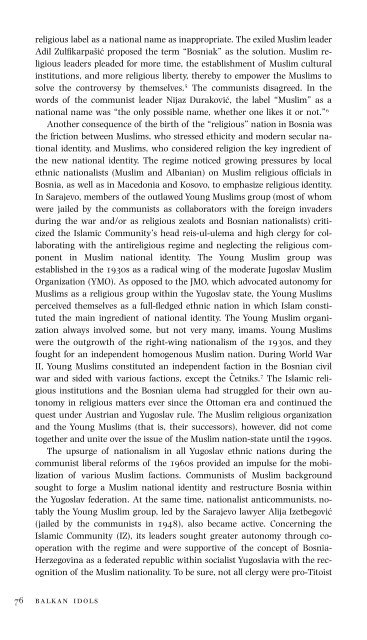Balkan Idols: Religion and Nationalism in Yugoslav States
Balkan Idols: Religion and Nationalism in Yugoslav States
Balkan Idols: Religion and Nationalism in Yugoslav States
You also want an ePaper? Increase the reach of your titles
YUMPU automatically turns print PDFs into web optimized ePapers that Google loves.
eligious label as a national name as <strong>in</strong>appropriate. The exiled Muslim leader<br />
Adil Zulfikarpasˇić proposed the term “Bosniak” as the solution. Muslim religious<br />
leaders pleaded for more time, the establishment of Muslim cultural<br />
<strong>in</strong>stitutions, <strong>and</strong> more religious liberty, thereby to empower the Muslims to<br />
solve the controversy by themselves. 5 The communists disagreed. In the<br />
words of the communist leader Nijaz Duraković, the label “Muslim” as a<br />
national name was “the only possible name, whether one likes it or not.” 6<br />
Another consequence of the birth of the “religious” nation <strong>in</strong> Bosnia was<br />
the friction between Muslims, who stressed ethicity <strong>and</strong> modern secular national<br />
identity, <strong>and</strong> Muslims, who considered religion the key <strong>in</strong>gredient of<br />
the new national identity. The regime noticed grow<strong>in</strong>g pressures by local<br />
ethnic nationalists (Muslim <strong>and</strong> Albanian) on Muslim religious officials <strong>in</strong><br />
Bosnia, as well as <strong>in</strong> Macedonia <strong>and</strong> Kosovo, to emphasize religious identity.<br />
In Sarajevo, members of the outlawed Young Muslims group (most of whom<br />
were jailed by the communists as collaborators with the foreign <strong>in</strong>vaders<br />
dur<strong>in</strong>g the war <strong>and</strong>/or as religious zealots <strong>and</strong> Bosnian nationalists) criticized<br />
the Islamic Community’s head reis-ul-ulema <strong>and</strong> high clergy for collaborat<strong>in</strong>g<br />
with the antireligious regime <strong>and</strong> neglect<strong>in</strong>g the religious component<br />
<strong>in</strong> Muslim national identity. The Young Muslim group was<br />
established <strong>in</strong> the 1930s as a radical w<strong>in</strong>g of the moderate Jugoslav Muslim<br />
Organization (YMO). As opposed to the JMO, which advocated autonomy for<br />
Muslims as a religious group with<strong>in</strong> the <strong>Yugoslav</strong> state, the Young Muslims<br />
perceived themselves as a full-fledged ethnic nation <strong>in</strong> which Islam constituted<br />
the ma<strong>in</strong> <strong>in</strong>gredient of national identity. The Young Muslim organization<br />
always <strong>in</strong>volved some, but not very many, imams. Young Muslims<br />
were the outgrowth of the right-w<strong>in</strong>g nationalism of the 1930s, <strong>and</strong> they<br />
fought for an <strong>in</strong>dependent homogenous Muslim nation. Dur<strong>in</strong>g World War<br />
II, Young Muslims constituted an <strong>in</strong>dependent faction <strong>in</strong> the Bosnian civil<br />
war <strong>and</strong> sided with various factions, except the Četniks. 7 The Islamic religious<br />
<strong>in</strong>stitutions <strong>and</strong> the Bosnian ulema had struggled for their own autonomy<br />
<strong>in</strong> religious matters ever s<strong>in</strong>ce the Ottoman era <strong>and</strong> cont<strong>in</strong>ued the<br />
quest under Austrian <strong>and</strong> <strong>Yugoslav</strong> rule. The Muslim religious organization<br />
<strong>and</strong> the Young Muslims (that is, their successors), however, did not come<br />
together <strong>and</strong> unite over the issue of the Muslim nation-state until the 1990s.<br />
The upsurge of nationalism <strong>in</strong> all <strong>Yugoslav</strong> ethnic nations dur<strong>in</strong>g the<br />
communist liberal reforms of the 1960s provided an impulse for the mobilization<br />
of various Muslim factions. Communists of Muslim background<br />
sought to forge a Muslim national identity <strong>and</strong> restructure Bosnia with<strong>in</strong><br />
the <strong>Yugoslav</strong> federation. At the same time, nationalist anticommunists, notably<br />
the Young Muslim group, led by the Sarajevo lawyer Alija Izetbegović<br />
(jailed by the communists <strong>in</strong> 1948), also became active. Concern<strong>in</strong>g the<br />
Islamic Community (IZ), its leaders sought greater autonomy through cooperation<br />
with the regime <strong>and</strong> were supportive of the concept of Bosnia-<br />
Herzegov<strong>in</strong>a as a federated republic with<strong>in</strong> socialist <strong>Yugoslav</strong>ia with the recognition<br />
of the Muslim nationality. To be sure, not all clergy were pro-Titoist<br />
76 balkan idols


